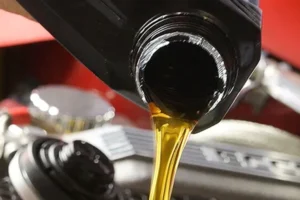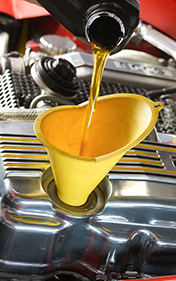Essential Guide to oil-changes in El Paso
 Keeping up with the recommended preventative car maintenance routine will help keep your vehicle in the best shape possible while helping to extend its lifespan. One key component of this preventative maintenance is routine professional oil change service. This service is the easiest, most affordable, and most effective way to help ensure your vehicle’s engine can run optimally.
Keeping up with the recommended preventative car maintenance routine will help keep your vehicle in the best shape possible while helping to extend its lifespan. One key component of this preventative maintenance is routine professional oil change service. This service is the easiest, most affordable, and most effective way to help ensure your vehicle’s engine can run optimally.
Neglect on the vehicle owner’s part is the number one cause of most instances of engine failure. So, to put it simply, keeping up with the recommended schedule of routine oil changes will save your engine from undue stress and costly repairs down the road.
In this guide, we’ve broken down everything you need to know about oil change service, including the benefits, exactly what happens during an oil change, how often it should be done, and more.
The Important Benefits of Regular Oil Change Services in El Paso
Other than knowing that they need to be done every few months, most drivers don’t think too much about oil changes. But your vehicle enjoys some very important benefits from ensuring that it has good, clean oil running through the engine, including:
1. Engine Oil Reduces Excess Friction & Engine Wear
The last thing you want to hear from your engine is metal grinding on metal. But that’s exactly what will happen once the motor oil gets too dirty or old, and the oil filter hasn’t been changed. One of the roles that clean oil plays is to properly lubricate delicate engine components. Overly dirty oil can’t perform this task effectively; eventually, these parts will begin to rub directly together, which can cause the engine to seize up. If that happens, your vehicle will be undrivable and need to be towed to your closest auto shop for significant engine repairs.
2. Oil Keeps the Engine Clean
If anything in your vehicle is going to be kept clean, it should be your engine. That’s exactly what clean engine oil does. When it cycles through the engine, it traps the grime and dirt that can build up, keeping the engine clean and free of excess contaminants. But the oil can only absorb so much. If it isn’t changed regularly, the oil filter can get clogged with gunk, leading to costly engine damage.
It’s worth noting that simply topping off existing oil when it gets low isn’t an effective solution. Diluted oil won’t be able to properly keep your engine clean and protected.
3. Engine Oil Absorbs Excess Heat
While your engine is running, there is a high level of heat generated by all the metal parts moving around inside. Without protection, the engine will quickly overheat. Clean oil works to absorb this excess heat. But, if the engine oil is overly dirty, it can’t properly protect your engine from overheating. It can even start to reflect the heat, causing additional engine problems.
4. Oil Prevents Rust & Corrosion Inside the Engine
Rust and corrosion are two of the most harmful things to the metal parts inside your engine. Another important role motor oil plays is preventing these from building up in your engine. Having routine oil change service will ensure the oil can continue doing its job.
5. Oil Changes Optimize Gas Mileage
As you can see, clean oil enables the engine to run smoothly, without excess heat and friction. This means your gas mileage will be optimized. Fuel efficiency will be significantly reduced when an engine needs to work harder due to dirty oil and a dirty filter.
6. Other Engine Issues Can Be Identified
A professional oil change service also allows your mechanic to look for any other issues that may be present in your vehicle. This prevents small issues from turning into big and much more expensive problems down the road. Here at Martin Tire Company, our mechanics will provide a best-in-class oil change service and conduct a thorough multi-point vehicle inspection every time.
What Happens During a Professional Oil Change Service in El Paso
It can be tempting to go the DIY oil change route. But, even though it may seem like a simple task, a properly performed oil change service is more thorough and something that should be left to the professionals.
A full-service oil change at a professional auto service shop will include:
- Draining and disposing of the old, dirty oil.
- Replacing the old oil filter with a new, clean filter.
- Refilling the engine with the proper amount of new, clean oil.
- Lubricating high-wear areas, like the chassis, hood, and door hinges.
- Inspecting the condition of the other system fluids, including the transmission, brake, and power steering fluids.
- Topping off the windshield washer fluid and coolant as needed.
- Checking the tire pressure, belts, hoses, battery, lights, and wiper blades.
- Inspecting the engine air filter and the vehicle’s in-cabin filter.
As you can see, many tasks are performed during an oil change service that help your vehicle continue running its best.
How Often You Should Have an Oil Change Done
One of the most frequently asked questions about oil change services is how often it should be done. There is no catch-all answer to this question. What oil change schedule is best for your vehicle is impacted by a variety of factors. But your owner’s manual from the vehicle manufacturer is the best place to look for an exact answer.
Some general guidelines can help give you an idea, though, of how often oil changes should be done:
- If using conventional oil, it should be changed every 3,000 miles.
- If a synthetic blend oil is used, it should be changed roughly every 5,000 miles.
- If using full-synthetic oil, it should be changed every 5,000 to 7,500 miles.
- The oil should be changed more frequently as the mileage increases and the vehicle ages.
- If you’re frequently driving in stop-and-go traffic or towing or carrying heavy loads, the oil should probably be changed more frequently.
- The oil should also be changed more frequently if the engine starts to burn oil, produce smoke, or both.
The ASE-certified master mechanics at Martin Tire Company can help you determine your vehicle’s best oil change schedule.
And if you’re looking for oil change coupons, make sure to check out our Coupons page for the latest deals to help you save even more money and keep up with preventative maintenance more easily.
Signs That Your Engine May Need an Oil Change
There are several warning signs to be aware of that indicate a need for an oil change service, including:
The oil appears darker than normal.
- Metal flecks are present on the dipstick.
- The dipstick shows a low oil level.
- Loud and unusual engine noises.
- The Check Engine light is on.
- Reduced engine performance.
If any of the above is happening, bring your vehicle to your closest service center location for an inspection and professional oil change service.
The Different Types of Engine Oil Explained
The wide range of different types of vehicles, driving habits, and mileage means there are numerous different types of oil available today.
Before we get into exactly what the different types are, there are two important factors that apply to all engine oils: viscosity and weight.
- Viscosity refers to how easily the oil pours. Thin oils have a low viscosity and pour faster at low temperatures, while thicker oils have a higher viscosity and pour more slowly. All engine oils are allocated a viscosity rating by the Society of Automotive Engineers (SAE). You’ll usually find this rating printed on the bottle of oil.
- The weight is a description of the oil’s viscosity and is also given by the SAE. This is the number allocated to the oil based on how well it flows at 210°F, which is the operating temperature, roughly, for most engines.
Now, here’s a breakdown of the different types of engine oil:
Conventional Oil
Also sometimes referred to simply as “standard” or “regular” oil, this oil is made from crude mineral oil and is only partially refined, making it cheaper than other oil types. Conventional oil can still provide adequate protection for most engines but will get dirty faster. That’s why an oil change service is needed more often if an engine is running conventional oil. But, when changed routinely, this oil can still help your engine reach 125,000 miles or more.
Full-Synthetic Oil
Unlike conventional oil, full-synthetic oil is highly refined and entirely manufactured in a factory or lab. This oil withstands high temperatures better and breaks down at a slower rate compared with conventional oil. Full-synthetic oil costs more than other oil types but offers the highest performance and engine protection. Most of today’s vehicle manufacturers recommend using full-synthetic oil.;
Synthetic Blend Oil
Synthetic blend oil is a combination of the best of both conventional and full-synthetic oil, making it a great option for drivers who can’t (or don’t want to) pay the premium price for full-synthetic oil.
About 45% of all vehicles on the road today are using either a synthetic blend or full-synthetic oil. If you’re trying to decide which option is best, there are a couple things to consider:
- Synthetic blend oil still contains some mineral oil, meaning its performance will depend on exactly how much mineral oil is used. The higher the amount, the lower the performance will be and the shorter the oil’s lifespan. But synthetic blend oil is less expensive and only needs to be changed slightly more often than full-synthetic oil.
- Full-synthetic oil can help further extend your engine’s lifespan because it has better viscosity, performs better at both high and low temperatures, and has better chemical stability. It also more effectively resists thermal breakdown, sludge buildup, and oxidation.
High-Mileage Oil
The sensitive components inside engines that have over 75,000 miles need extra protection. High-mileage oil was designed for this purpose. This oil directly attacks problems that plague many older engines, such as higher oil burn-off, corrosion, and leaking gaskets. This oil uses viscosity modifiers, special cleaners, anti-corrosion agents, and seal conditioners.
Diesel Oil
Large diesel engines run dirtier than traditional gasoline engines. So, they need a strong oil that can sufficiently keep them clean. Packed with special additives, diesel engine oil does just that. Because the oil picks up a large amount of debris and dirt, a diesel engine will need more frequent oil change services.
When it comes to which oil you should be using, there is no one-size-fits-all answer. You should always go with what is recommended by your vehicle’s manufacturer. In most cases, several different oil types will be recommended to account for different driving habits and environments. And there is nothing wrong with switching between synthetic and conventional. Doing so won’t have any adverse consequences on your engine.
If you’re having trouble determining which type of oil would be best for your vehicle, we can help! Just ask your Martin Tire Company oil change specialist for their expert opinion.
Routine Oil Change Service Will Keep Your Engine Protected & Running Its Best
Sticking to a schedule of routine oil change services is the best (and easiest!) investment you can make to keep your engine running its best. Not doing so could mean dealing with an overheating engine, worn internal components, and even a totally seized-up engine.
The ASE-certified master mechanics at every Martin Tire Company location can help keep your engine properly protected and running its best. We work hard to provide top-quality customer service and reliable auto care service at reasonable prices.
Our expert service team is here to meet all your vehicle’s auto service needs, from routine preventative maintenance to in-depth engine repairs and everything in between!
